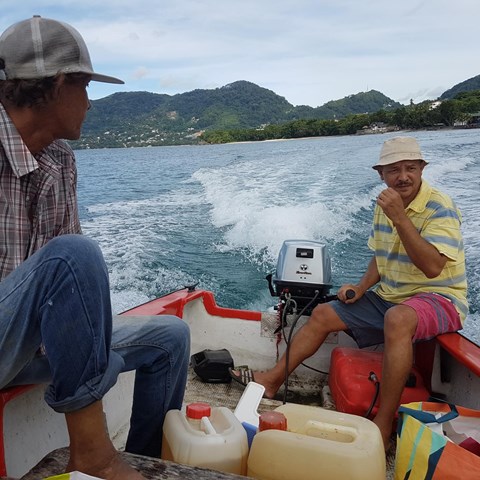Contact
Massimiliano Cardinale, Researcher
Department of Aquatic Resources, Institute of Marine Research, SLU
massimiliano.cardinale@slu.se, +46 10 478 40 14

Globally the livelihood of more than a billion people is related to fish and the fishery industry. Fish and shellfish has high economic value, but are also a highly exploited natural resource and in need of sustainable and professional management.
To build capacity for improved management in less developed countries the Faculty of Natural Resources and Agricultural Sciences (NJ) at SLU has conducted a “Tag -along” project at the headquarter of IOTC – The Indian Ocean Tuna Commission – the organization responsible for the management of tunas and tuna-like species in the Indian Ocean region.
"Fisheries for tunas and tuna-like species are globally important not only by providing high quality protein but due to the high economic value and extensive international trade, they are also an important global commodity. The fisheries also provide food security, offer job opportunities in the fisheries and aquaculture industries and thus stimulating economic growth and poverty alleviation", says associate Prof. Massimiliano Cardinale from the Department of Aquatic Resources at SLU (SLU Aqua), who participated in the IOTC "Tag-along" project.
NJ:s "Tag-along" initiative aims at building capacity at the faculty for conducting research in the field of global development. The goal of the IOTC is to improve management of marine resources in less developed countries and establish a network and grounds for future GD-related projects or activities in Mozambique through the creation of a specific project with two PhD positions for Mozambican applicants.
There are 32 nations represented in IOTC, some of which not actually bordering the Indian Ocean but with a common interest in sustainable fishery for tunas. Among the member nations, 10 are listed as Least Developed Countries (Comoros, Eritrea, Guinea, Madagascar, Mozambique, Sierra Leone, Somalia, Sudan, Tanzania and Yemen).
A crucial part of the work of IOTC is to conduct assessment (hereby defined as stock assessment) of the status of the most important commercial species exploited in the Indian Ocean. Stock assessment is a crucial prerequisite for sustainable exploitation of fisheries resources and is underpinning modern management.
Massimiliano Cardinale also participated as a scientific expert in several of the IOTC working parties, providing advice on tunas and billfishes, including important commercial species for European market (such as yellowfin and skipjack), but also on smaller coastal tuna species, which are vital for coastal communities in the Indian Ocean. Dr. Cardinale has worked to provide IOTC with fisheries advice for 2018 and beyond, and collaborated with scientists from the IOTC Secretariat, namely Mr. Dan Fu and Mr. Fabio Fiorellato, responsible for stock assessment and data management activities, respectively.
"Detailed, timely and high-quality information on fishing activities and catches are the keys to successful fisheries analysis and management initiatives", says Mr. Fiorellato – that joined IOTC in March 2016. "One of the most challenging aspects of this work is ensuring that member countries fully understand the importance of the data they collect. As scientists involved in supporting data processes, we have to highlight that there are actual fishermen and their families, which will ultimately be affected by the accuracy of the scientific advice and the effectiveness of the management actions."
"The IOTC Scientific Committee plays a vital role in the management of IOTC fisheries." confirms Mr. Fu, who has worked with Max Cardinale in the "tag along initiative". Mr Fu, who led the 2018 stock assessment of yellowfin tuna also noted "as the stock assessments get more complex, we have to be increasingly careful to make sure that the advice from the Scientific Committee can be understood by the managers, and this is a very challenging aspect of our work".
Both Mr. Fu and Mr. Fiorellato together with Massimiliano Cardinale from SLU and many other scientists from EU and countries around the Indian Ocean will continue in the next years to work in order to provide the best advice for the sustainable exploitation of fish stocks and the marine environment in the Indian Ocean.
Massimiliano Cardinale, Researcher
Department of Aquatic Resources, Institute of Marine Research, SLU
massimiliano.cardinale@slu.se, +46 10 478 40 14